Years ago, Kyiv was home to the House of Master Classes, an art centre where the creative spirit and talents of contemporary artists converged. It was a vibrant hub for experimentation, collaboration, and emerging artists. Although the building itself could not withstand the harsh economic conditions of the time, its essence did not fade; it evolved into a new form. Founding partners Yevhen Utkin and Iryna Budanska envisioned that this spirit should continue within the sacred and empowering grounds of the St. Sophia of Kyiv Reserve. Thus, their vision materialised.
Recently, the seventh edition of the Bouquet Kyiv Stage high art festival concluded, reaffirming that even in times of war, life and art persist. This year’s festival embraced the slogan “From the Syan to the Don,” evoking the historical expanse of the Ukrainian state as conceived by our ancestors. Spanning four days, the festival featured its traditional array of events: a lecture hall beneath the ash tree, a cinematic bouquet, visual arts, music labs, a children’s programme, craft workshops, and the central music stage.
***
Listening to Sophia
When the Church of Saint Sophia of Kyiv was erected in the early 11th century, its design took into account a myriad of factors. Intended not only as a spiritual haven for the Kyivan state but also as a hub of education and the embodiment of its core values, every detail was meticulously planned. From the choice of construction materials and sacred geometry to acoustics and mosaic pigments, the church’s design was harmoniously integrated. Ingeniously, the temple’s walls incorporate built-in jugs that enhance acoustics without the need for modern technology.
The festival commenced with a moving performance by the “Dzvinochok” (‘The Bell’) choir, composed primarily of teenagers, within the hallowed confines of St. Sophia. They sang prayers and traditional folk songs, reviving the ancient practice of gathering at this sacred site to listen to its timeless messages. At the festival’s inaugural talk beneath the venerable ash tree—celebrating its 107th anniversary this year—Kharkiv philosopher and theologian Oleksandr Filonenko remarked, “That is why our soldiers are holding weapons now, because Beauty is unarmed. They are the defenders of this Beauty.” The lecture series traditionally unfolds under this ancient ash, regarded with deep reverence as a living participant in the festival’s dialogues.
This year’s discussions delved into the elusive nature of justice in wartime. Filonenko’s second guest was Ukrainian Orthodox clergyman and blogger Heorhii Kovalenko, rector of the Open Orthodox University of St. Sophia the Wisdom. “I arrived at St. Sophia on March 1, 2022, seeking permission to record a prayer before the Oranta. At that moment, it felt like the only thing I could do. We did it, and I felt as though she was speaking to us,” reflected Kovalenko. “Though I’ve spent years here and learned much, it was during the full-scale war that Sophia truly began to communicate.”
Kovalenko observed that the inscription on the pediment of St. Sophia encapsulates the essence of our victory. It reads: “God’s Power and God’s Wisdom Sophia,” a profound statement of the values we should embody. He mentioned that Ukrainians possess a wisdom akin to Sophia’s, which typically emerges in times of crisis, yet he believes we should strive to live by this wisdom every day, not just in the face of danger.
Oleksandr Filonenko continues the discussion by noting that to truly grasp the essence of a church, one must examine its central icon. In the Church of the Nativity of the Blessed Virgin Mary, located within the grounds of St. Sophia, the focal point is not an icon but a Greek inscription: “The wisdom of Sophia made a home for herself.” Filonenko emphasises that this Home represents a vital source of hope. At the heart of the church, amidst the traditional depictions of apostles and sacred figures, Sophia is portrayed holding a child. This image signifies that Sophia gave birth to a daughter who would eventually become the mother of Christ. This depiction draws attention to the profound role of womanhood and the divine feminine. It transcends the physicality of a home, reflecting instead the highest form of femininity, the great mother, and inviting reflection on this profound aspect of wisdom and nurturing”.
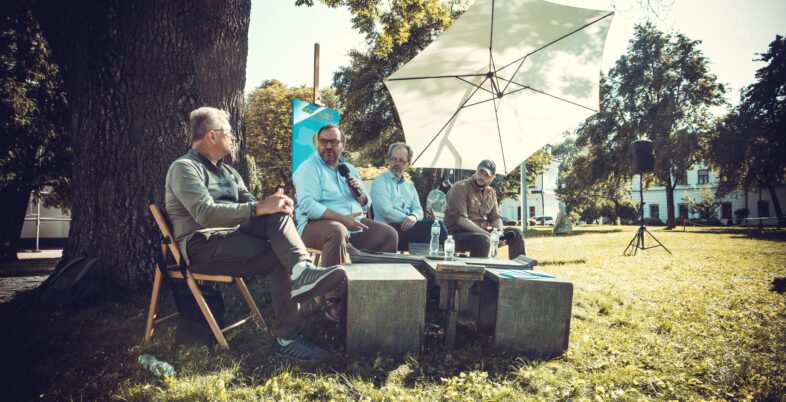
Photo: Oleksandr Filonenko and Heorhii Kovalenko
“Theological discussions today are deeply engaged with understanding the distinctive nature of the Kyivan theological school and its influence. What kind of theology emerged from Kyiv, and what impact did it have beyond? It turns out that the central concern was to define what it means to be an active individual capable of effecting societal change. This focus led to the rise of figures like Petro Mohyla, who began the transformation of the principality of Rus’—part of the Polish-Lithuanian Commonwealth—into a cultural centre with Kyiv at its heart. Their efforts started with the Lavra and extended to the restoration of St. Sophia of Kyiv. In this context, Sophianism, or practical wisdom, became associated with the femininity of the Virgin Mary. Thus, Kyiv’s approach presents a paradox: to cultivate a dynamic and transformative leader, we must understand how Sophia’s wisdom relates to femininity. Without grasping this connection, we cannot fully comprehend the origins of those courageous individuals capable of reshaping society, the country, and the world”.
The princess who found a new home
This year’s festival featured a significant premiere: the cross-cultural project “Yaroslav and Ingigerda: Life Story-Love Story”. This artistic endeavour sheds light on the pivotal role of Ukraine-Rus’ in the global historical tapestry. Centred on the life and romance of Prince Yaroslav the Wise and his Swedish princess, Ingigerda, the project highlights their profound influence on the Kyivan state and their descendants’ impact on European monarchical alliances.
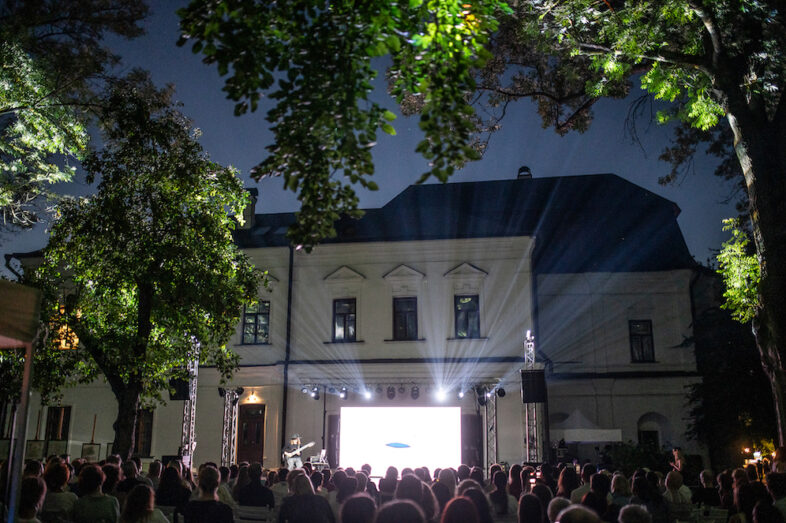
Photo: The cross-cultural project “Yaroslav and Ingigerda: Life Story-Love Story”.
A year ago, the Master Class House proposed an ambitious festival in Sweden to celebrate the enduring ties between the two countries, symbolised by the union of Yaroslav and Ingigerda. The story of their marriage began with less than ideal circumstances: the 16-year-old princess, with her own dreams and aspirations, was wed to the much older Yaroslav and transported far from her homeland. However, what started as a politically motivated union blossomed into a fulfilling 30-year partnership, producing seven children and leaving an indelible mark on both Kyivian and European affairs.
The visual foundation of the project was crafted by sisters Alina and Karina Gaeva, both accomplished designers and artists. Immersing themselves in the archives of St. Sophia of Kyiv, they meticulously researched ancient sources to inform their work. Their efforts resulted in a series of evocative illustrations, starting with a portrait of Ingigerda. These visuals were later brought to life in an animated film, enhanced by the music of Maksym Kolomiets, a rising star in contemporary composition known for his operas and musical innovations. The premiere at the festival marked the first public viewing of this performative project, which also featured a live portrayal of Ingigerda by actress Kateryna Kisten, who delivered the princess’s story from her own perspective. The film, devoid of dialogue, is rich with period symbols, immersing viewers in a timeless experience that connects them with the legacy of our ancestors. Additionally, the sisters’ works were showcased in a dedicated exhibition, highlighting their artistic contribution to this remarkable project.
Our Shevchenko
The first evening of the festival culminated in a poignant performance titled “Our Shevchenko,” featuring the Telnyuk Sisters alongside the Armed Forces Symphony Orchestra. Although Taras Shevchenko remains a cornerstone of Ukrainian literature, each generation reinterprets his work through the lens of contemporary experience. The Telnyuk Sisters, whose family endured the harsh realities of totalitarian repression—having had a dissident father—brought a profound emotional depth to their renditions of Shevchenko’s poetry.
The Ukrainian Armed Forces Symphony Orchestra augmented this evocative performance, enveloping the audience in the gravity and grandeur of Ukraine’s present struggles. In this moment of convergence, where history seems to intersect with the present, the performance underscored that the current conflict is not merely territorial but a fight for cultural and civilizational values. This, too, was a theme anticipated by Shevchenko in the 19th century.
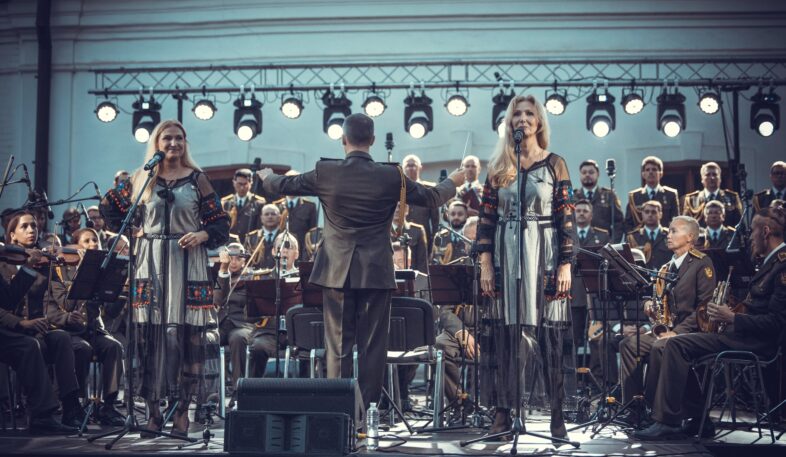
Photo: Telnyuk Sisters and the Ukrainian Armed Forces Orchestra
For some time now, the Telnyuk Sisters have maintained a concert tradition that they carry from performance to performance. During these concerts, both the audience and the performers join in tapping out the rhythm with their hands and feet—echoing a Ukrainian version of “We Will Rock You.” They also recite Oksana Zabuzhko’s poem “A Line from an Autobiography,” which reflects on our illustrious ancestors and the reasons behind centuries of Ukrainian persecution, suggesting that the long-standing attempts to erase Ukrainians stemmed from something worth destroying. Each time this collective performance takes place, it resonates like a powerful incantation and a resolute stance aimed at overcoming and ending the centuries-old war.
Musicians between the wars
On one of the festival evenings, Oleksiy Kogan, a seasoned jazz researcher, festival organizer, music journalist, and radio host, took the stage at the main open-air venue. He introduced the Israeli band Yogev Shetrit Duo.
“They’re among the few musicians who didn’t ask us about the situation in Ukraine and whether it’s safe to come here. They truly understand us,” Kogan remarked.
The duo, comprised of drummer and composer Yogev Shetrit and pianist David Shetrit, showcased their program, “The Way of Tradition.” Their performance delved into the rich cultural tapestry of Andalusian music, blending Moroccan motifs, African rhythms, and a fusion of diverse global influences.
Throughout their set, Yogev Shetrit frequently addressed the audience with heartfelt “Glory to Ukraine,” which only heightened the warmth and connection between the performers and the crowd. The musicians expressed that they were deeply moved by the openness and sincerity of their Ukrainian audience.
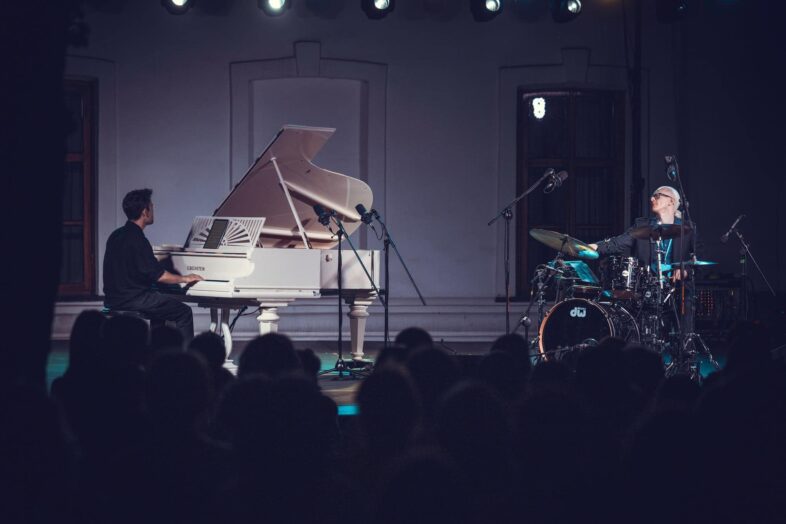
Photo: Israeli jazz duo comprised of drummer and composer Yogev Shetrit and pianist David Shetrit.
Ukraine-Austria and the cello
A notable highlight of Kyiv’s cultural scene was the recent collaboration between Austrian cellist Jörg Zwicker and the National Soloists Ensemble Kyiv Camerata. Zwicker, a renowned cellist and conductor known for his extensive European tours, chose this significant moment in Ukraine’s history to bring his artistry to Kyiv.
He led the Ukrainian musicians in a performance of Baroque music at the historic St. Sophia Church. The concert was infused with a unique neuromusical energy, creating an extraordinarily immersive experience. The acoustics of the venue, coupled with the profound silence of the audience, allowed even the subtlest notes to resonate clearly.
Zwicker first visited Kyiv in the 1990s, where he conducted master classes and performed at the National Music Academy as part of the Open Opera Ukraine project in 2021-2022. The demand for his performance was so great that the festival organized two sessions—one in the afternoon and another in the evening—to accommodate as many attendees as possible.
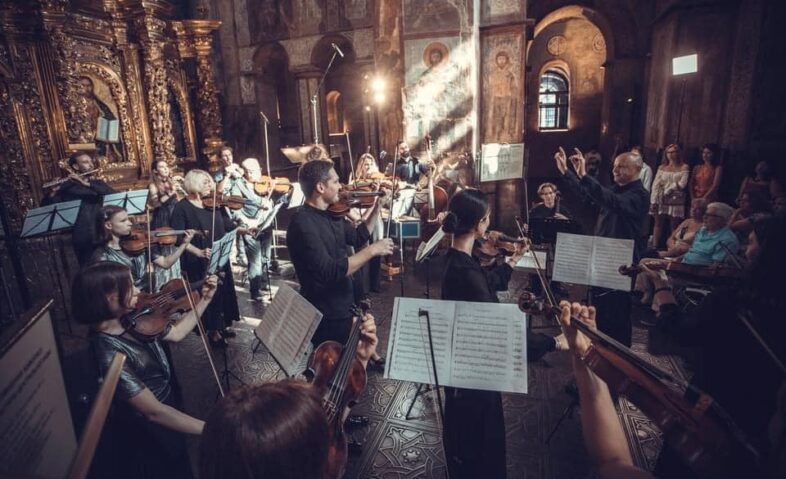
Photo: Austrian cellist Jörg Zwicker and the National Soloists Ensemble Kyiv Camerata.
A cross-artistic platform
Over the years, Bouquet Kyiv Stage has established itself as a pivotal cross-artistic platform where profound themes are explored through diverse creative expressions. It serves as a hub for musical experimentation, featuring a unique laboratory that operated throughout the festival, both indoors and outdoors. The event’s compelling visual program showcased Ukrainian artists who delve into the impact of war while reconnecting audiences with timeless values.
A poignant tribute was paid to Arseniy Fedosenko, the talented photographer and soldier who tragically lost his life during a combat mission last summer. Throughout the festival, conversations held under the ancient ash tree honoured his legacy. Fedosenko had captured the intricate process of grape harvesting and winemaking, highlighting the dedication and delicacy involved in nurturing life from the vineyard to the bottle. His work reflected the deep connection between human effort and the creation of something enduring and beautiful.

